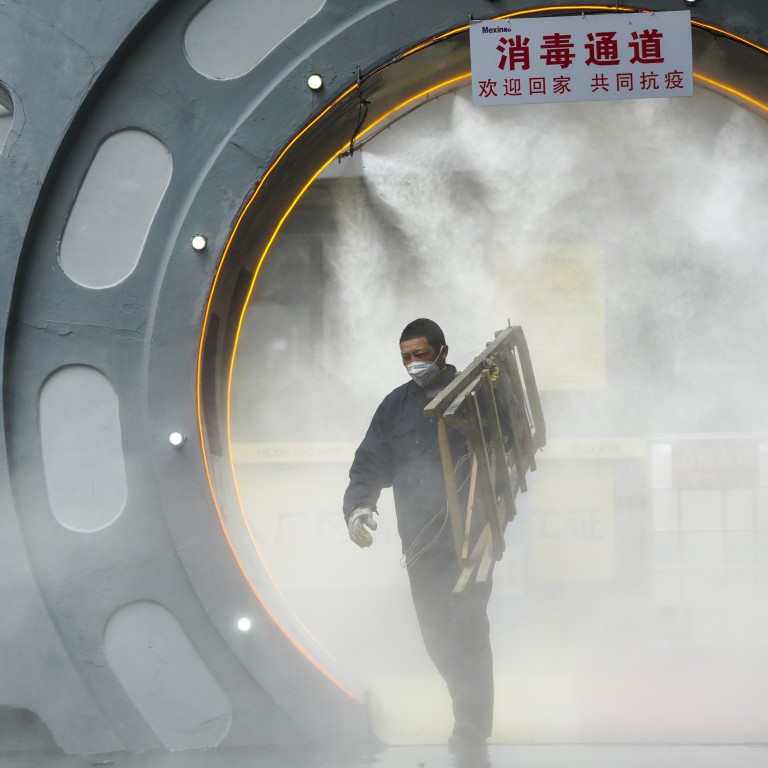
From climate change to the coronavirus, complex adaptive systems thinking is key to handling crises
- The theory recognises that the world’s human and natural systems are dynamic and characterised by complex interrelationships
- Governments must take the multisectoral, interdisciplinary steps required to understand and address the risk of pandemics before they arise
Complex adaptive systems thinking emerged in the 1980s. It is based on the recognition that the world’s human and natural systems are non-linear, characterised by complex interrelationships, and dynamic. As a result, the challenges we face, including the coronavirus, are borderless, integrated and interconnected, often in unseen ways.
The outbreak and spread of the coronavirus represent a classic example of what happens when we fail to address our challenges as parts of one system. Demand for certain animals – for food, cultural and other reasons – now brings people increasingly into close contact with animals that can carry deadly viruses, likely including the coronavirus, thereby putting humanity at risk of the next pandemic.
India, a coronavirus catastrophe waiting to happen?
Governments have failed to recognise the complexity that characterises this risk. They thus have failed to take the multisectoral, interdisciplinary steps required to understand and address the risk of pandemics before they arise. The current outbreak has occurred as a result of this failure.
Much still is unknown concerning the nature of China’s response to the emerging disease. Some believe it deserves credit for being aggressive. But it appears clear that the Chinese government did too little to empower those who might have understood, and prevented, the outbreak. In addition, during the critical early days of the outbreak, China’s state security system took over the response, minimising the concerns of medical professionals and others with expertise. Lamentably, some other countries dependent on China have been slow to take action, fearful of Chinese economic retaliation.

Imagine a different scenario. Suppose the Chinese authorities had given primary responsibility to medical and scientific personnel to address the underlying systemic reasons a virus might emerge. Epidemiologists might have identified the animal hosts of the virus and made recommendations on how to prevent an outbreak. Live markets might have been closed. Other changes might have been suggested concerning how domesticated animals are raised and used.
Medical supplies and capacity might have been increased in critical locations. Interactions between humans and wild animals could have been minimised. And other countries could have been encouraged to take appropriate actions, undeterred by the fear of retaliation.
More also could have been done before the outbreak to educate people concerning the risk of a pandemic and how to recognise when one threatens to emerge. Technology, education, and a media campaign could have been used for this purpose.
Doctors aren’t enough – to fight the new coronavirus, we need an all-of-science response
All of these steps and others would have put public health and security officials in a better position to isolate and treat the first patients.
This is not the first time a failure to apply interdisciplinary measures based on a systemic understanding has made a situation worse. Severe acute respiratory syndrome (Sars) is a good example. The global failure to respond to climate change is another. Without understanding that global challenges such as the coronavirus emerge because of the relationships between and among complex adaptive systems, the current crisis won’t be the last.
There is reason for optimism. The recognition of the interconnected nature of human and natural systems has led some to apply the principles of complex adaptive systems theory to international relations and solving global challenges.
The clearest example is the Sustainable Development Goals (SDGs) adopted by the United Nations in 2015. The 17 goals are a cohesive, integrated plan for addressing the economic and social forces threatening people and the planet. They recognise that each of the goals, and their achievement, is interdependent.
Unfortunately, the political momentum behind the SDGs has faded as the international social and economic order has undergone seismic changes, including rising nationalism and trade wars. But the SDGs do provide a strong framework for applying systems-based actions, especially because countries have flexibility in the strategies they take to meet them.
Today’s biggest problems defy simple, short-sighted solutions. We can improve our chances of solving them if we define them accurately and completely – but in order to do so, several things will be necessary.
First, and most importantly, we need to empower institutions, especially those with multilateral portfolios, to study and understand the complex adaptive systems on which we depend to propose practical, lasting solutions to global challenges.
No coronavirus, but Indonesia’s handling of Wuhan evacuees highlights erosion of trust
Second, a narrative explaining the value of interrelated systems needs to be developed and encouraged by the media to socialise the idea among all stakeholders. Education will help us move beyond the boundaries of outdated, one-dimensional thinking that focuses only on responding to our challenges.
Third, we need to incentivise alliances among governments, the private sector, non-governmental organisations and the public.
Finally, governments need to rethink their architecture. Empowering ministries and agencies to manage specific areas and issues, without creating mechanisms for them to work in a coordinated way, is a recipe for ineffectual and even harmful action.
Understanding and applying the concepts of complex adaptive systems may not prevent the next virus outbreak. But if we fail to use them, we will be ensuring the next pandemic.
Ambassador (Ret.) David Carden served as the first resident US Ambassador to the Association of Southeast Asian Nations (Asean). As US Ambassador, he oversaw the broadening engagement of the United States in Southeast Asia. Under his leadership, the US Mission to Asean focused on the human and natural systems that affect the region and worked to build alliances to help Asean achieve it goals. He is also the author of Mapping ASEAN: Achieving Peace, Prosperity and Sustainability in Southeast Asia

